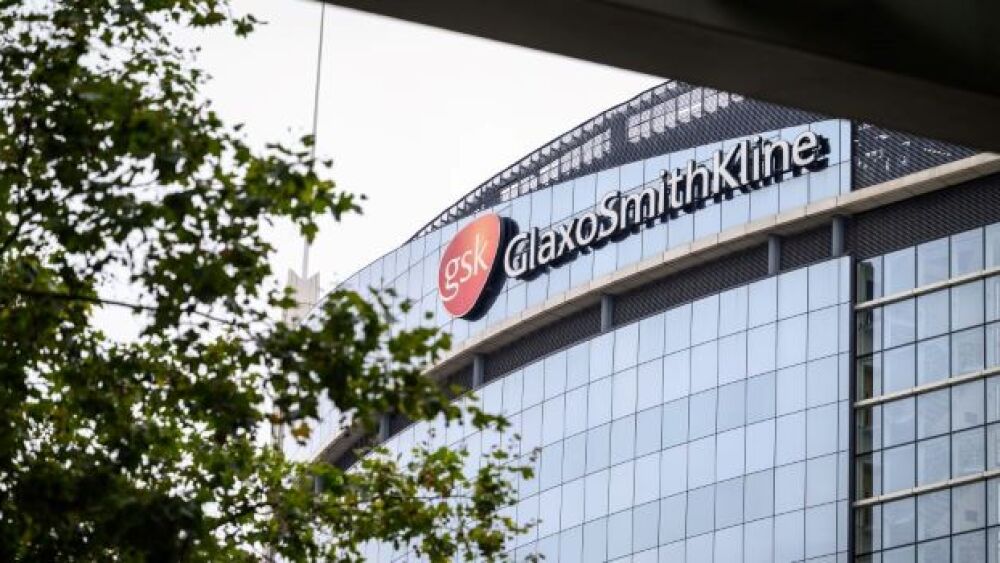Mersana unveiled a global collaboration with GSK, which gives GSK the exclusive option to co-develop and commercialize Mersana’s antibody-drug conjugate XMT-2056.
Leon Neal/Getty Images
Clinical-stage biopharma company Mersana Therapeutics unveiled a global collaboration with GlaxoSmithKline Monday afternoon, which gives the industry behemoth the exclusive option to co-develop and commercialize Mersana’s antibody-drug conjugate (ADC) XMT-2056.
The deal entitles Mersana to a $100-million upfront option purchase fee. Should GSK choose to opt in, the Massachusetts-based company will continue to receive up to $1.36 billion in development, regulatory and commercial milestones.
Meanwhile, Mersana has yet to surrender its options to profit-share and co-promote XMT-2056 in the United States. If it chooses to share profits, Mersana will be eligible to receive tiered royalties on its candidate’s sales outside the country; if not, it will still be in line for double-digit tiered royalties on net global sales.
“GSK brings highly complementary development and commercial capabilities, a wealth of immuno-oncology experience, a deep knowledge of the STING pathway and a shared vision for XMT-2056’s broad potential,” Anna Protopapas, president and CEO of Mersana said in a statement. “The agreement structure demonstrates our ability to generate meaningful non-dilutive capital upfront to support the development of our innovative candidates.”
John Lepore, SVP of Research at GSK, touted the potential shown by XMT-2056, saying, “Its preclinical data demonstrate how it might work to harness the immune system by activating the STING pathway, and its differentiated mechanism of action offers the potential for additional clinical benefit in patients with HER2-expressing tumors.”
Mersana Establishes Position in ADC Space
Indeed, GSK isn’t Mersana’s first big backer. In February, the company inked a research and licensing deal with another industry giant, Janssen, to discover and develop novel ADCs against cancer. This agreement will see Mersana put forward its proprietary Dolasynthem platform and take charge of preclinical studies, while Janssen will take responsibility for clinical trials and commercialization.
This research and licensing deal will kick off with a $40 million upfront payment to Mersana, which is looking at potential earnings of over $1 billion in milestones and royalties.
Mersana’s recent high-value deals reflect the company’s vision to be a leader in the competitive and fast-growing ADC space. Its current agreement with GSK is centered around XMT-2056, the first ADC developed using the company’s Immunosynthen platform, which is designed to identify ADCs that can activate the STING pathway in both tumor and tumor-resident immune cells.
XMT-2056 targets a novel epitope of the HER2 receptor and, in preclinical studies has demonstrated that it could significantly suppress tumors that have either high or low levels of HER2 expression, even when given as a standalone therapy. The candidate led to even better outcomes when used with different approved anti-cancer agents. Mersana is looking at a Phase I study to assess XMT-2056’s potential in different indications, including breast and gastric cancers.
“From a financial perspective, this is a very meaningful deal for an early-stage ADC asset,” Protopapas said during an investor call Monday. “We believe its magnitude serves as recognition of our differentiated Immunosynthen platform, the strength of our preclinical data and the transformational potential of XMT-2056.” The $100-million upfront option fee also extends Mersana’s runway into the first half of 2024, “well beyond important inflection points,” according to Protopapas.
By betting such a large sum of money on XMT-2056, GSK seems to agree that Mersana’s candidate holds huge potential. If GSK does end up opting in, it will add XMT-2056 to its ADC pipeline, which includes three Phase III studies involving Blenrep targeting B cell maturation antigens to address multiple myeloma. XMT-2056 will also join another STING agonist, GSK3745417, which is still in Phase I studies for a variety of cancers.
Blenrep was approved in August 2020 as a monotherapy treatment for adult patients with relapsed or refractory multiple myeloma who have already received four previous lines of treatment.






